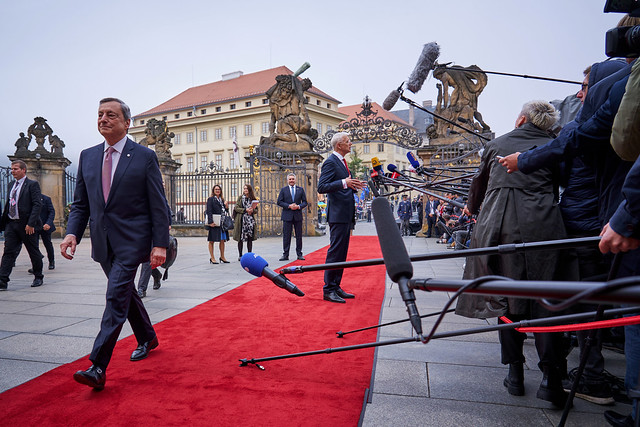On 6-7 October, Prime Minister Krišjānis Kariņš participated in the first meeting of the European Political Community and the informal meeting of the Heads of State and Government of the European Union - the European Council, in Prague. The priority topics covered at the meetings and discussions were closer cooperation between European countries to jointly overcome the impact of Russia’s war in Ukraine, which has led to an increase in energy prices and inflation.
On Thursday 6 October, the first meeting of the European Political Community was held in Prague. It brought together leaders of 27 EU Member States and 17 other European countries to discuss security, economic development, climate and energy, migration and mobility-related issues, with a view to building closer cooperation between European countries. Prime Minister Krišjānis Kariņš pointed out that Russia's war in Ukraine poses challenges for Europe as a whole, which cannot be overcome by countries individually. It is therefore essential to hold discussions on enhanced cooperation with countries such as Norway, Switzerland, the United Kingdom, etc.
Prime Minister Krišjānis Kariņš and Prime Minister of Ukraine Denys Shmyhal also held a bilateral meeting within the framework of the European Political Community’s meeting where K. Kariņš emphasized that Latvia supports Ukraine's accession to the European Union and NATO, and will continue to provide all forms of support to Ukraine, continuing its fight against Russia’s military invasion.
On Friday 7 October, an informal meeting of the Heads of State and Government of the European Union - the European Council meeting, was held in Prague where the EU leaders discussed Russia's war on Ukraine, energy security and economic development.
Following the meeting, the Prime Minister pointed out that the EU fully supports Ukraine and will continue to provide all necessary assistance to win this war. However, in the context of the ongoing war in Ukraine, the energy prices must be addressed at the EU level to reduce prices for natural gas and thereby also the expenditure on electricity and heating for businesses and the public. The EU leaders will continue to debate these issues at the next European Council meeting to be held at the end of October.
The EU leaders also addressed the security of critical infrastructure in the light of the recent sabotage against the Nord Stream pipeline and agreed on the need to enhance cooperation for protecting and strengthening the security of the critical infrastructure.




